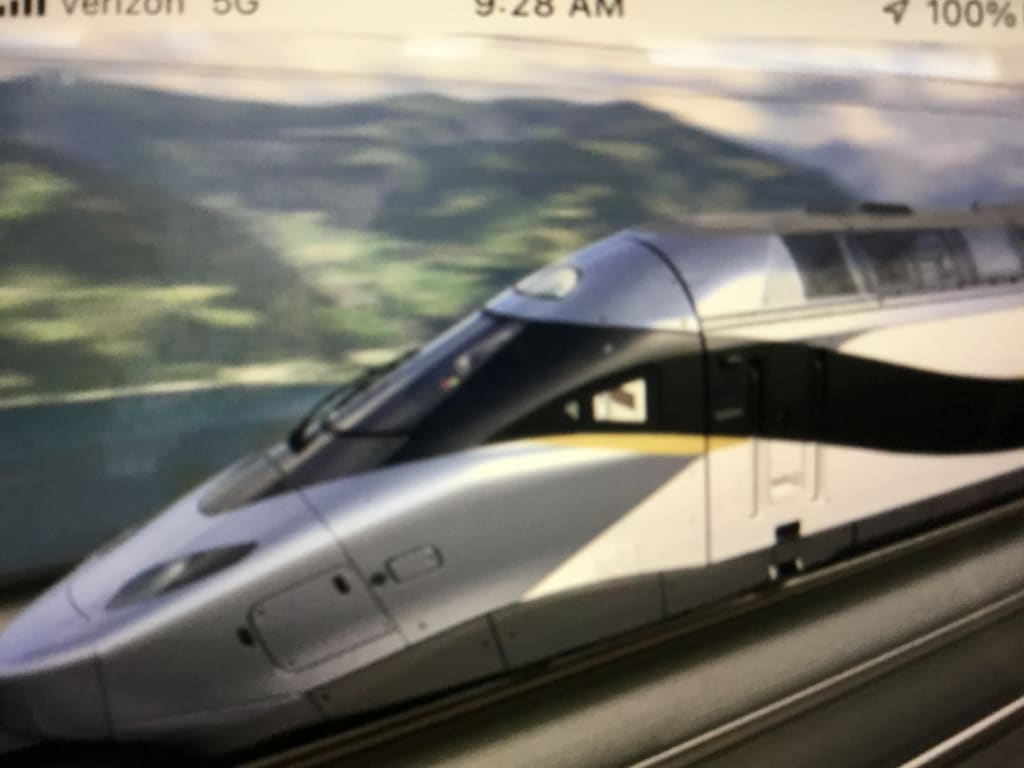
I woke with a start, consulting my watch for a date and time. August 12, 2029, one-twenty in the afternoon. As the fog cleared in my head, I tried to remember boarding this train. The last thing I remember I was in the Kitami train terminal waiting for the American military attache to the ambassador of Japan to arrive from Osaka. A dizzying feeling crept over me. I looked around for the attache—there was no sign of him.
Across the aisle from me to my left, sat a Japanese boy around the age of fifteen with a woman—probably his mother. The boy was playing chess on an electronic chess board. In the seat in front of me was a woman in a business suit with blonde hair…hopefully English speaking. Her back faced me, so I tapped her shoulder. She turned around with a sneer, removed her earbuds, slammed her laptop closed and looked at me clearly annoyed. I ignored the drama.
“Do you speak English?” I asked.
“Yes,” she said indignantly with a slight accent.
“Can you tell me where this train is headed?”
“Osaka. How could you not know that?”
“Because I have no memory of boarding.”
“I’m not surprised,” she said. “When they brought you in, you appeared to be drunk.” And with that she turned her back to me and replaced her earbuds. I tapped her shoulder again.
“What did the people look like that put me on this train?”
“Military,” she said. “Japanese military.”
“Do you speak Japanese?” I asked.
“Look, we don’t know each other and I’m prepping for a meeting. And, yes I speak Japanese, as well as a few other languages. I’m a translator. What is it you need?”
“I apologize Ma’am. I’m Jack Lubrick. I was in the Kitami train terminal at eleven o’clock this morning waiting to meet someone and the next thing I know I wake up on this train.” I patted my inside jacket pocket for my passport, phone and credentials; they were gone.
I settled back to get my bearings when I noticed a briefcase at my feet. I opened it—inside was a manila envelope with a letter:
Mr. Lubrick: it has become your distinct misfortune to be on the fast train to Osaka. Your meeting with the American attache is…well, let’s just say you’ll not be making his acquaintance. The train you are on is doomed. Soon the train will pick up speed to 300 km/h and won’t stop until it explodes upon reaching the Osaka terminal. Surely the CIA will miss you, while at the same time disavowing any knowledge of your existence. Enjoy your journey.
I grabbed the laptop computer from the blonde in front of me, “What time did this train depart from Kitami?”
“What are you doing! Give that back!” She demanded.
I handed her the letter.
“What’s this?”
“Read it!” I said. “What time did we depart Kitami?” I repeated.
She looked at her watch, “An hour and forty minutes ago.”
“What time is the scheduled arrival in Osaka?”
“Four-thirty. Please return my computer!”
I looked for the distance to Osaka from Kitami, it was over a thousand miles; at 300 km/h, this train’s highest speed, I calculated that at one hundred eighty miles an hour we had less than three hours to derail or we blow-up. I ran to the control room in the front of the train; it was unmanned and the control panel was blinking wildly. I studied the switches. God bless the Japanese for visual aids, but I had no idea what some of them were.
I thought about what I knew about the MAGLEV train: magnetic levitation works via magnets rather than fuel, and electrical currents keep iron blocks in the rails magnetized. Precise placement of repelling magnets on both the train and the rails keep the cars levitated while also moving the train forward. Not much help in the current circumstance.
There must be a way to short out the electricity. If the metal blocks do not maintain magnetization, the train will fail to move forward. I ran the length of the train counting cars, there were ten. There were no working windows and the glass must be at least an inch thick, given the pressure generated by the train’s speed.
I sprinted back to my seat and looked at my watch; it was 2:00 p.m. The blonde was now typing furiously on her computer.
“What are you doing?” I asked.
“I’ve written to the Japanese Embassy in New York, but the internet just now stopped working. I’m trying to reconnect; I don’t think my message sent.”
“Try your cell. See if you have any bars.”
“Negative. No bars.”
“Damn it! I need an engineer,” I looked at this woman, she was quite attractive except for the fear on her face. “Can you go coach to coach to see if there are any engineers on board? And, what is your name?”
“Chantal. Chantal Aubert. I’m French/American.”
“Okay Chantal, get going.” With that she approached each car with a question in Japanese, French, English and German: “There is an emergency with the train, are there any engineers on board?” Not one engineer, and Japan was loaded with them. She returned with the bad news. It was now 2:15 p.m.
The mother of the teenaged boy sitting across from me raised her hand to speak to Chantal in Japanese:
“My son is a prodigy, maybe he can help?” I looked at Chantal.
“What did she say?”
“She thinks her son is a prodigy. What mother doesn’t?”
“Translate for me,” I said, turning to both the mother and her son:
“Do you know anything about the mechanics of the train we’re on?”
“Yes, I do,” answered the boy, “and I speak English.” The boy continued:
“This train runs on electromagnetic propulsion. Two magnets with opposite polarities will attract and stick to one another, right? But in this case…,” I stopped him right there.
“Okay, you know your stuff.”
“What’s your name, son?”
“Yoshi,” he said.
“Yoshi, if you were to try to stop this train, how would you do it? We need to stop this train before it reaches Osaka.” Yoshi thought for a minute as precious seconds ticked by.
“I can’t think of any way to disrupt the electrical power to the magnets, but maybe if we can disrupt or stop the magnets from repelling each other the train will slow or stop.”
At that moment, the train picked up speed, just as that damned letter said it would. The boy instinctively turned toward the window. I looked at Chantal; her eyes were watering and her lips quivered. I resisted the urge to calm her. Our time was running out.
Thanks to Chantal’s emergency announcement, chatter on the train was getting loud and making it difficult to hear. I motioned Yoshi to follow me to the front of the train. Chantal followed. I closed the door leaving a lot of confused passengers behind. I pointed to the control panel…still blinking rapidly. Yoshi took immediate interest in the controls, reading the visual aids, and said, “Look here.” He pointed to a wire running from one control switch to another and then running below the command panel.
“These are the switches to stop the train.”
I saw what he was talking about. I pulled away the panel cover below the controls. There were plastic explosives rigged to blow if the wire was disturbed in any way. I carefully replaced the front panel cover.
“We need to get out of here and pray no one touches those switches. There are plastic explosives behind that control panel.” We moved into the aisle outside the control room door.
“This train is moving at 300 km/h now, which means we will reach Osaka in less than two hours.”
“We need a miracle,” said Yoshi.
Something told me to move all passengers to the back four cars. The train is not at capacity—it should work. “We need to secure this control room,” I said.
We were silent for a minute. A miracle indeed, I thought, when my eye caught sight of an axe on the wall in an emergency box just outside the door to the control room. I wondered why such a thing existed on a train with one-inch thick windows. Could we hack a hole into the side of the train? If we did, what would we do then?
There was something Yoshi had said to me earlier: “If we can stop the magnets from repelling each other the train will slow or stop.” That’s it! We need to magnetize something and drop it on the tracks to confuse the system into stopping on its own. Putting a hole into the side of a train moving three hundred miles an hour sounds mad, but right now it is the only idea I have.
“Yoshi! Do you know how to make magnets?” I asked him. Chantal shot me a look that registered, ‘You’re out of your mind.’ She looked weary and afraid and was biting her nails, but I had no time to reassure her.
Yoshi answered, “Yes. We need batteries, conductive wire and some iron or steel to shock with electricity from the batteries.
“Chantal please make an announcement that we need all passengers to move to the rear of the train and that we need all the batteries anyone might have with them in their carry-ons—flashlights or anything else.”
“Yoshi, you collect the batteries and sort them by size.”
“Chantal, after you make your announcements, you need to go back to the control room. We need to dismantle the lights for wire…look for a box that might have tools, like wire cutters or a strong pair of scissors, and look also for a first-aid kit. We need tape.” Chantal moved quickly.
I recruited four strong men to axe a hole in the side of the train near the floor in the second car. Chantal returned with a small, heavy pair of scissors and a few screwdrivers, a first-aid kit and two hand-held spotlights with huge battery cells. That latter was a welcome find!
“Chantal, you are amazing!” I said as if seeing her for the first time. “Now see if you can find an electrician to rip out those lights.” They had to think on their feet now, and pay close attention to the tasks at hand. Ninety-five minutes to arrival in Osaka.
Three other passengers began removing metal from whatever they could find with the screwdrivers. I smiled for the first time thinking this might just work. Soon others joined in to remove the footrests on the backs of the seats—they were twelve by eight inches, remarkably the perfect size.
“Yoshi, can you magnetize these?” I asked, pointing to a couple of dozen footrests.
Yoshi nodded yes, “They should work to interrupt the magnetic field that is making this train haul ass,” said Yoshi. I laughed out loud at Yoshi’s comment. He was a treasure.
Two German-speaking men came forward with wire.
“They are not electricians,” Chantal explained, “but they knew how to dismantle the lighting system.”
The two men decided to hang around to help Yoshi wrap wire around the footrests. Still, we needed more help. I recruited four more men.
By taking turns with the axe, the muscle had finally gotten through the side of the train with a medium-sized hole. Strong winds blew in, emphasizing just how fast we were traveling. The men worked furiously to make the hole big enough to drop our newly made magnets onto the track. Placing the magnets exactly right was paramount, and so was the timing. I consulted Yoshi.
“Can you think of a strategy for dropping these magnets?” I asked Yoshi.
“Yes. I think they should be dropped as the front of the train starts to go around a bend. It’s our best chance of success, because the curve will automatically slow the train’s thrust, and once the magnets are in place south of the bend the train will have a more difficult job of moving forward and will likely come to a stop.”
“Do you know where a bend in the track might be coming up?”
“Yes, I compete in chess matches in Osaka—my mother and I ride this train once a month, and there is a long viaduct bridge over a lake, about thirty feet high. It will be dangerous because there will be no land to step onto once the train stops, if it stops. We will be elevated with nowhere to go.”
It was no time for old sayings, but I couldn’t help thinking that ‘we will cross that bridge when we come to it.’
I had no way of knowing if the train would blow when it came to a stop from the explosives likely packed under the train. What I do know is if we don’t get off this train we will be blown to bits in Osaka. I’d much rather we take our chances of falling into the lake; at least we’d have a fighting chance. I looked at my watch; it was 3:40 p.m.
“Chantal, warn the passengers to brace themselves for a sudden stop,” I said.
Yoshi, Chantal and I sat in the company of the muscle men, the Germans and other passengers who helped remove the footrests Everyone buckled in except for me and Yoshi. We watched for the bridge. We were in position with our magnets. The bridge came into sight—at this speed it would be mere seconds before we needed to act.
I counted: “Three, Two, One,” and Yoshi threw the first magnet between the rail and the guideway walls—it didn’t seem to do much. I handed him another, and another, and another, continuing to do this until levitation on the left side of the train dropped. Metal scraped against metal creating a shower of sparks and the train was now lopsided. Yoshi fearlessly continued tossing the footrests and, as he predicted, the train slowed to a violent and sudden stop. Yoshi and I were sent flying across the train floor.
Cheering came from the back four cars. But we weren’t out of danger yet because the bomb we suspected was planted under the train could still blow. If it was set to explode upon arrival instead of by remote, we had a chance but we still had to work fast to clear everyone before 4:30. I had the unfortunate task of returning to the train’s control room to open the electronic doors. Chantal gave the passengers directions to exit the train from the rear door and walk steadily on the guideway walls, a mere ten inches in width, without looking down. They only had to walk about forty feet, but they needed to work fast.
I looked at my watch. It was 4:00 p.m.
I heard what sounded like a flight of helicopters approaching. I froze in my tracks. Was the rogue militia coming to finish the job? No. They were U. S. Marine military Mi-26 helicopters, ten of them, each large enough to carry sixty people. Chantal’s message to the embassy in New York must have gotten through after all!
They dropped ropes to passengers as they appeared in the doorway. Two ropes at a time, each holding two people. The ropes had loops for feet and hands, and the helicopters had two open hatches with giant winches ready to pull the ropes up.
We directed passengers to exit from every other door on the train so three copters could line up for the task. As soon as one helicopter was full, it flew off for another to take its place. The servicemen were professionals, and had the train unloaded in half an hour—it was now 4:35 p.m. and the train was still standing.
Everyone had departed but for me, Chantal and Yoshi. A helicopter extended ropes and Yoshi grabbed on, beckoning Chantal to join him.
“I will grab the next rope,” Chantal said, and with that Yoshi waved to the crew and up he went.
Chantal and I looked at each other and I extended my hand to help her grasp onto the other rope, when what I really wanted to do was kiss her.
Chantal turned to me with tears running down her face. She accepted my hand and said, “Forgive me.” She reached up on her toes to kiss me squarely on the lips. I leaned into it—hours of pent-up adrenaline turned my kiss into savage hunger.
“I’m sorry,” I said as I pulled away. “It’s the adrenaline talking.”
“What? You’re not taking responsibility for that kiss?”
I thought about that for a few seconds, wiped away her tears and grabbed her around her waist and kissed her hard. I think I could love this woman.
About the Creator
Claire Butler
Claire Butler is a writer/author, professional artist and francophile. She loves spending her day either behind her computer, in front of her easel or studying French. She lives in Cincinnati, Ohio.
Enjoyed the story? Support the Creator.
Subscribe for free to receive all their stories in your feed. You could also pledge your support or give them a one-off tip, letting them know you appreciate their work.






Comments
There are no comments for this story
Be the first to respond and start the conversation.